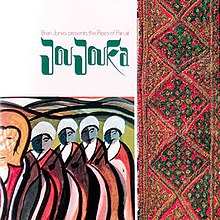Brian Jones Presents the Pipes of Pan at Joujouka
| Brian Jones Presents the Pipes of Pan at Joujouka | |
|---|---|
 |
|
| Live album by Brian Jones and Master Musicians of Joujouka | |
| Released | October 8, 1971 September 26, 1995 |
| Recorded | 29 July 1968, Jajouka, Morocco |
| Genre | Folk music |
| Language | Moroccan dialect |
| Label | Rolling Stones Records |
| Producer | Brian Jones |
| Professional ratings | |
|---|---|
| Review scores | |
| Source | Rating |
| Allmusic | |
Brian Jones Presents the Pipes of Pan at Joujouka is an album produced by Brian Jones of the Rolling Stones. The album was a recording of the Moroccan group the Master Musicians of Joujouka, in performance on 29 July 1968 in the village of Jajouka in Morocco and released on Rolling Stones Records, and distributed by Atco Records in 1971. Jones called the tracks "a specially chosen representation" of music played in the village during the annual week-long Rites of Pan Festival. It was significant for presenting the Moroccan group to a global audience, drawing other musicians to Jajouka, including Ornette Coleman.
The album was reissued in 1995. The executive producers were Philip Glass, Kurt Munkacsi, and Rory Johnston, with notes by Bachir Attar, Paul Bowles, William S. Burroughs, Stephen Davis, Jones, Brion Gysin, and David Silver. This deluxe album included additional graphics, more extensive notes by David Silver and Burroughs, and a second CD, produced by Cliff Mark, with two "full-length remixes."
Painter/novelist Brion Gysin first heard music from the area with American writer Paul Bowles at a festival in Sidi-Kacem in 1950. Entranced with the music's sound, he later was led to the village to hear the music in person by Moroccan painter Mohamed Hamri. Gysin, along with Hamri, brought Brian Jones to hear the village music in 1968.
The album's music included songs meant for the village's "most important religious holiday festival, Aid el Kbir". The festival's ritual of dressing a young boy dressed as "Bou Jeloud, the Goat God" wearing the "skin of a freshly slaughtered goat", involved the child's running to "spread panic through the darkened village" as the musicians played with abandon. Gysin connected the ritual, performed to protect the village's health in the coming year, to the fertility festival of Lupercalia and the "ancient Roman rites of Pan"; he referred to the Bou Jeloud dancer as "Pan" and "the Father of Skins". This name stuck, leading to the reference to Pan in the album's title.
...
Wikipedia
